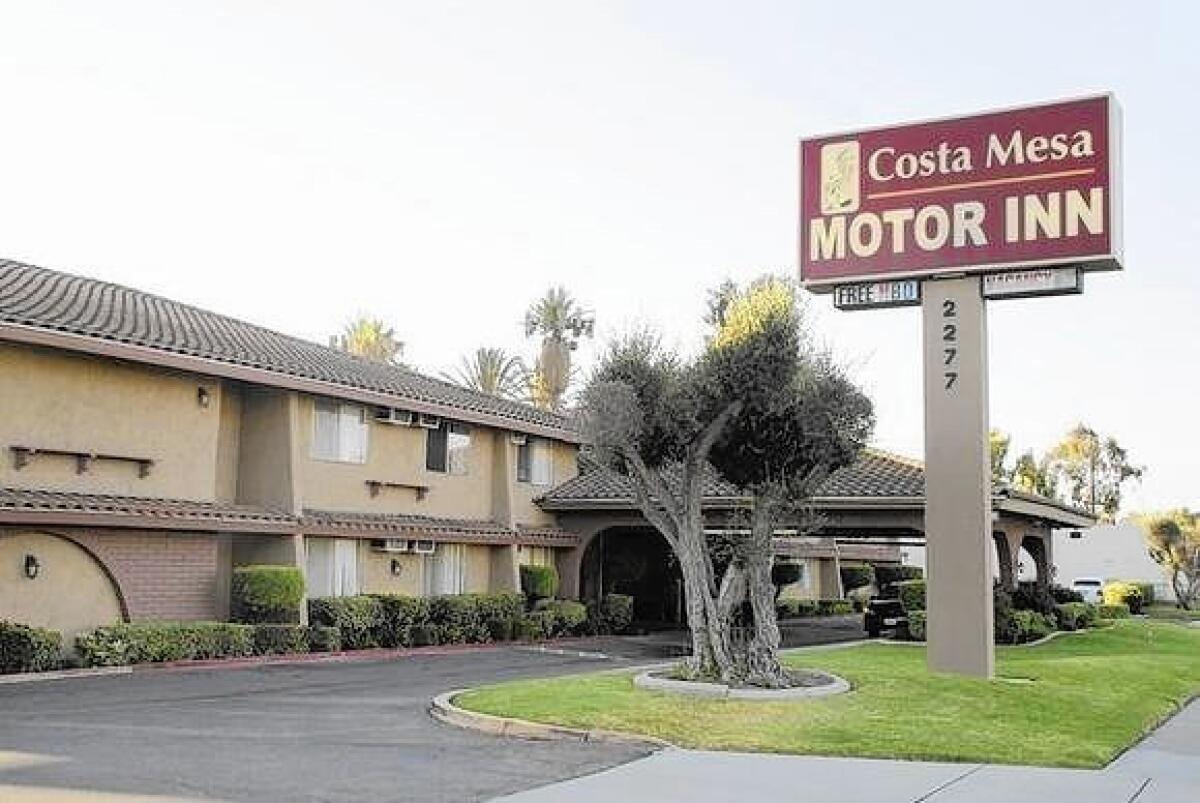Affordable-housing group sues to stop Costa Mesa Motor Inn redevelopment

- Share via
An affordable-housing advocacy group has filed a lawsuit against the owner of the Costa Mesa Motor Inn, alleging that the company’s plans to demolish the motel and replace it with luxury apartments violate state law.
The Irvine-based Kennedy Commission’s complaint, filed Jan. 28 in Orange County Superior Court, against Miracle Mile Properties and the city of Costa Mesa contends that both parties circumvented a state development law after the City Council in November approved 224 high-end apartments to replace the 236-room Motor Inn.
According to the lawsuit, the density bonus law allows developers to build more units on a property than originally permitted only if a percentage of the new units are set aside for senior citizens or low-income residents.
The nonprofit commission argues that Miracle Mile and Costa Mesa failed to comply with the law because none of the 224 units would be set aside for those tenants.
Miracle Mile, the property owner, received a density bonus for the 4.15 acres at 2277 Harbor Blvd. of 54 units an acre, above the city’s high-density definitions, which are as high as 40 units per acre.
Though Miracle Mile agreed to make rent at 20 of the 224 units below market rate for moderate-income households, the lawsuit contends that “moderate” could mean as much as $1,830 a month — much too expensive for Motor Inn residents.
A Miracle Mile representative told city officials last year that rents at the motel, built in the 1970s, ranged from about $1,200 to $1,300 a month. The rooms, some with kitchenettes, are 300 square feet.
Miracle Mile has argued that it could not afford to include affordable housing in the project because it did not receive any government subsidies to help pay for it.
Neither Miracle Mile nor Costa Mesa’s attorneys have filed responses to the complaint in court.
In a statement Friday, Miracle Mile spokesman Don Lamm said it was “unfortunate” that the commission “did not open any dialogue with the property owner” before filing the lawsuit.
“We believe there are always positive solutions if people are willing to meet and discuss their demands,” Lamm said. “Regardless, the city and property [owner will] respond to the lawsuit at the appropriate time.”
The commission argues the city avoided the density bonus law by devising and “fabricating” development and density “incentives” for Miracle Mile because officials knew the Los Angeles-based company’s proposed project “does not meet any of the eligibility thresholds under the density bonus law.”
The lawsuit also alleges that Miracle Mile’s promised relocation packages — valued at up to $5,500 — for Motor Inn residents don’t comply with state law and were submitted without public comment.
The commission is seeking unspecified damages for residents and for the city to stop enforcing, administering or implementing the project’s approvals.
“City officials repeatedly degraded and insulted long-term and low-income motel residents,” the lawsuit states, “including calling them ‘transients’ and ‘pimps, prostitutes and parolees’ and accusing long-term-occupancy hotels of attracting ‘all of the county’s problems.’ ”
Without residential motels like the Motor Inn, “many low-income residents would find themselves homeless and on the streets,” according to the lawsuit.
The commission’s complaint names Mayor Steve Mensinger and Mayor Pro Tem Jim Righeimer, who the suit says “made no secret of their plan to provide incentives to motel operators who closed their motels to make way for new development.”
Costa Mesa city spokesman Tony Dodero said: “We’re going to vigorously defend the city. As a general rule, however, we don’t discuss the details of existing litigation.”
Miracle Mile was originally slated to close the Motor Inn by Aug. 1.
But the Kennedy Commission’s case is the second to put the estimated $50-million project, as well as the promised resident relocation packages, on hold.
The owners of Pals Vacuum Sewing Center, a store at 2299 Harbor Blvd., adjacent to the Motor Inn, sued Miracle Mile and Costa Mesa in December, primarily on grounds that the height of the new apartment complex would interfere with cellphone towers on the store’s property. They contend it would harm the towers’ transmission abilities by as much as 30% and, in turn, affect the owners’ ability to make economic use of their land.
